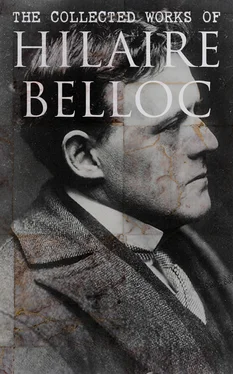These instruments were what have been called the "professional" armies. The term is very insufficient, and, in part, misleading. The gentry of the various Powers, mixed with whom were certain adventurers not always of gentle blood, were the officers that led these forces; and for the major part of the gentry in most European countries, the military career was the chief field of activity. The men whom they led were not a peasantry nor a working class, still less a civic force in which the middle class would find itself engaged: they were the poorest and the least settled, some would have said the dregs of European life. With the exception here and there of a man—usually a very young man whom the fabled romance of this hard but glorious trade had attracted—and with the exception of certain bodies that followed in a mass and by order the relics of a feudal lordship, the armies of the period immediately preceding the Revolution were armies of very poor men, who had sold themselves into a sort of servitude often exciting and even adventurous, but not, when we examine it minutely, a career that a free man would choose. The men were caught by economic necessity, by fraud, and in other ways, and once caught were held. No better proof of this could be found than the barbarous severity of the punishments attached to desertion, or to minor forms of indiscipline. So held, they were used for the purposes of the game, not only in what would make them serviceable instruments of war, but also in what would make them pleasing to their masters. Strict alignment, certain frills of parade and appearance, all that is required in a theatre or in a pretentious household, appear in the military regulations of the time.
I must not in all this be supposed to be belittling that great period between 1660 and 1789, during which the art of war was most thoroughly thought out, the traditions of most of our great European armies fixed, and the permanent military qualities which we still inherit developed. The men so caught as private soldiers could not but enjoy the game when it was actively played, for men of European stock will always enjoy the game of war; they took glory in its recital and in its memories; to be a soldier, even under the servile conditions of the time, was a proper subject for pride, and it is further to be remarked that the excesses of cruelty discoverable in the establishment of their discipline were also accompanied by very high and lasting examples of military virtue. The behaviour of the English contingents at Fontenoy afford but one of many examples of what I mean.
Still, to understand the wars of the Revolution we must clearly establish the contrast between the so-called professional armies which preceded that movement and the armies which the Revolution invented, used, and bequeathed to the modern world.
So also, to revert to what was said above, we must recall the dynastic and limited character of the wars in which the eighteenth century had been engaged; at the outbreak of the Revolution no other wars were contemplated by men.
Had you spoken, for instance, at any moment in 1789, to a statesman, whether of old experience or only introduced to political life by the new movement, of the position of Great Britain, he would at once have discussed that position in the terms of Great Britain's recent defeat at the hands of France in the affair of the American colonies. Had you discussed with him the position of Prussia he would at once have argued it in connection with Prussia's secular opposition to Austria and the Empire. Had you asked him how he considered Spain, he would have spoken of the situation of Spain as against France in the light of the fact that Spain was a Bourbon monarchy allied in blood to the French throne. And so forth. No true statesman imagined at the time, nor, indeed, for many years, that a war of ideas , nor even, strictly speaking, of nations , was possible. Even when such a war was actually in process of waging, the diplomacy which attempted to establish a peace, the intrigues whereby alliances were sought, or neutrality negotiated, were dependent upon the older conception of things; and the historian is afforded, as he regards this gigantic struggle, the ironic satisfaction of seeing men fighting upon doctrines the most universal conceivable and yet perpetually changing their conduct during the struggle according to conceptions wholly particular, local and ephemeral, and soon to be entirely swept away by time.
Napoleon himself must needs marry an Austrian archduchess as part of this old prejudice, and for years brains as excellent as Danton's or Talleyrand's conjecture the possibility of treating now England, now Prussia, as neutral to the vast attempt of the French to destroy privilege in European society!
One may say that for two years the connection of the revolutionary movement with arms had no aspect save that of civil war. True, whenever a considerable change is in progress in society the possibility of foreign war in connection with it must always arise. Were some European State, for instance, to make an experiment in Collectivism to-day, the chance of foreign intervention would certainly be discussed by the promoters of that experiment. But no serious danger of an armed struggle between the French and any of their neighbours in connection with the political experiment of the Revolution was imagined by the mass of educated men in France itself nor without the boundaries of France during those first two years. And, I repeat, the military aspect of those years was confined to civil tumult. Nevertheless, that aspect is not to be neglected. The way in which the French organised their civil war (and there was always something of it present from the summer of 1789 onwards) profoundly affected the foreign war that was to follow: for in their internal struggles great masses of Frenchmen became habituated to the physical presence, millions to the discussion, of arms.
It is, as we have seen in another part of this book, a repeated and conspicuous error to imagine that the first revolutionary outbreaks were not met sufficiently sternly by royal troops. On the contrary, the royal troops were used to the utmost and were defeated. The populace of the large towns, and especially of Paris, proved itself capable of military organisation and of military action. When to this capacity had been added the institution of the militia called the National Guard, there were already the makings of a nation wholly military.
Much in this exceptional and new position must be ascribed to the Gallic character. It may be said that from the fall of the Roman Empire to the present day that character has been permanently and of its own volition steeped in the experience of organised fighting. Civil tumult has been native to it, the risk of death in defence of political objects has been equally familiar, and the whole trade of arms, its necessary organisation, its fatigues and its limiting conditions, have been very familiar to the population throughout all these centuries. But beyond this the fact that the Revolution prepared men in the school of civil tumult was of the first advantage for its later aptitude against foreign Powers.
It is always well in history to fix a definite starting-point for any political development, and the starting-point of the revolutionary wars may easily be fixed at the moment when Louis, his queen and the royal children attempted to escape to the frontier and to the Army of the Centre under the command of Bouillé. This happened, as we have seen, in June 1791.
Many factors combine to make that date the starting-point. In the first place, until that moment no actual proof had been apparent in the eyes of European monarchs of the captivity of their chief exemplar, the king of France.
The wild march upon Versailles, in the days of October 1789, had its parallel in a hundred popular tumults with which Europe was familiar enough for centuries. But the rapidly succeeding reforms of the year 1790, and even the great religious blunder of 1791, had received the signature and the public assent of the Crown. The Court, though no longer at Versailles, was splendid, the power of the King over the Executive still far greater than that of any other organ in the State, and indefinitely greater than that of any other individual in the State. The talk of captivity, of insult and the rest, the outcries of the emigrants and the perpetual complaint of the French royal family in its private relations, seemed exaggerated, or at any rate nothing to act upon, until there came the shock of the King's attempted flight and recapture. This clinched things; and it clinched them all the more because more than one Court, and especially that of Austria, believed for some days that the escape had been successful.
Читать дальше












